The Laundry Files is a cross-genre series; it’s British, but beyond that it transgresses wildly by crossing the streams of normally rigid marketing categories. We have comedy, we have horror, we have magic, we have technology, we have spies. So: what else is out there that has a not-dissimilar feel to the Laundry Files?
Buy the Book
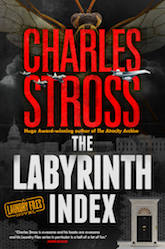

The Labyrinth Index
The works I want to point you at today all share three or more from a set of six attributes: they’re mostly British, their protagonists mostly work for bureaucracies (government or police, but also academia), and they mostly involve magic. They may also share other attributes—humour, time travel, and a seasoning of steampunk—but the latter three are a little more optional.
So, without further ado, here’s my “if you liked the Laundry Files you may like these” list.
The Peter Grant Series by Ben Aaronovitch
Midnight Riot (UK title: Rivers of London)
Moon over Soho
Whispers Under Ground
Broken Homes
Foxglove Summer
The Hanging Tree
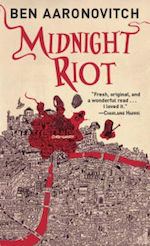 Police Constable Peter Grant of the London Metropolitan Police is a young, snarky, mixed-race cop from the east end. We first meet him interviewing a witness at a murder scene in London. Only problem is, the witness is a ghost. Peter’s unwelcome (because unverifiable) report comes to the attention of his higher-ups, and not in a good way: he’s reassigned to The Folly, a small and very eccentric station in the city that, he rapidly learns, deals with the kind of stuff nobody else in the huge, technocratic bureaucracy of the Met wants to acknowledge—namely, magic.
Police Constable Peter Grant of the London Metropolitan Police is a young, snarky, mixed-race cop from the east end. We first meet him interviewing a witness at a murder scene in London. Only problem is, the witness is a ghost. Peter’s unwelcome (because unverifiable) report comes to the attention of his higher-ups, and not in a good way: he’s reassigned to The Folly, a small and very eccentric station in the city that, he rapidly learns, deals with the kind of stuff nobody else in the huge, technocratic bureaucracy of the Met wants to acknowledge—namely, magic.
Apprenticed to the last registered wizard in the UK, Detective Chief Inspector Thomas Nightingale, Peter and fellow apprentice magic cop Leslie May find themselves sucked into the pursuit of magical criminals and the affairs of London’s local gods and goddesses.
So, here’s the thing: Aaronovitch nails 21st century British police bureaucracy and modern London’s vibrant, rich, multi-ethnic society. Peter Grant is a distinctively original cop, with family ties a-plenty in the streets he patrols. And there’s a seriously creepy vibe to the back story that gradually unpacks itself along the way to explaining why there is only one surviving registered wizard in London. Seriously? If you want more stuff like the Laundry Files? This is your number one destination.
The Shadow Police Series by Paul Cornell
London Falling
The Severed Streets
Who Killed Sherlock Holmes?
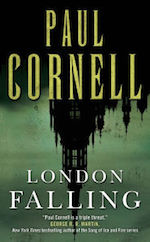 While the Peter Grant books mostly focus on one wisecracking protagonist (albeit an organization man), the Shadow Police series recognizes that modern policing—especially detective work—is a team activity. In this case, the detective team of Quill, Costain, Sefton, and Ross find themselves trying to work out why a gang boss’s head exploded in front of them in the interview room when he was about to spill his guts. As their investigation expands they find themselves sucked down a horrifying rabbit hole of kidnapping, child sacrifice, murder, and worse. London, it appears, faces supernatural threats from time to time, and at least one of them was so deadly that it wiped out the previous Metropolitan Police team that policed the occult; now their lives are on the line as they try to prevent the “smiling man” from taking the whole of London to hell.
While the Peter Grant books mostly focus on one wisecracking protagonist (albeit an organization man), the Shadow Police series recognizes that modern policing—especially detective work—is a team activity. In this case, the detective team of Quill, Costain, Sefton, and Ross find themselves trying to work out why a gang boss’s head exploded in front of them in the interview room when he was about to spill his guts. As their investigation expands they find themselves sucked down a horrifying rabbit hole of kidnapping, child sacrifice, murder, and worse. London, it appears, faces supernatural threats from time to time, and at least one of them was so deadly that it wiped out the previous Metropolitan Police team that policed the occult; now their lives are on the line as they try to prevent the “smiling man” from taking the whole of London to hell.
While the Peter Grant series has a rich vein of humour running through it, and a submerged vein of horror that occasionally breaks out, this is reversed in the Shadow Police books: occasional wise-cracking aside, they’re tense with foreboding and a sense of creeping doom that never quite leaves you.
The Rise and Fall of D.O.D.O. by Neal Stephenson & Nicole Galland
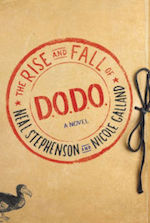 Okay, so neither Neal Stephenson nor Nicole Galland are British, but The Rise and Fall of D.O.D.O. is in other respects a good match for the same micro-genre as the Laundry Files. We have a secret research project run by the Pentagon, which is trying to establish why magic stopped working globally on one particular day in 1851 (and more importantly, whether it can be rebooted by technological means). We have a meet cute between Melisande, a very academic linguist, and Tristan, a West Point graduate with expertise in manipulating bureaucracy. Not to mention an egomaniacal (and extraordinarily old) Hungarian witch, a not-actually-mad professor’s attempt to verify the Many World’s Hypothesis by building a machine to carry out the Schrödinger’s Cat experiment (spoiler: the cat survived to a ripe old age), and then TIME TRAVEL. Lots of time travel, to the 16th century and the Victorian era. Lots of exciting ways to die as a result of time travel! And did I mention the bureaucracy?
Okay, so neither Neal Stephenson nor Nicole Galland are British, but The Rise and Fall of D.O.D.O. is in other respects a good match for the same micro-genre as the Laundry Files. We have a secret research project run by the Pentagon, which is trying to establish why magic stopped working globally on one particular day in 1851 (and more importantly, whether it can be rebooted by technological means). We have a meet cute between Melisande, a very academic linguist, and Tristan, a West Point graduate with expertise in manipulating bureaucracy. Not to mention an egomaniacal (and extraordinarily old) Hungarian witch, a not-actually-mad professor’s attempt to verify the Many World’s Hypothesis by building a machine to carry out the Schrödinger’s Cat experiment (spoiler: the cat survived to a ripe old age), and then TIME TRAVEL. Lots of time travel, to the 16th century and the Victorian era. Lots of exciting ways to die as a result of time travel! And did I mention the bureaucracy?
This is clearly a collaboration, and what Galland brings to it is a lighter and more accessible tone than your standard Neal Stephenson doorstep, rising almost to the level of a Pratchett comedy in its better sequences. It’s a lightweight, fun romp, and I’m looking forward to the expected sequel.
The Invisible Library Series by Genevieve Cogman
The Invisible Library
The Masked City
The Burning Page
The Lost Plot
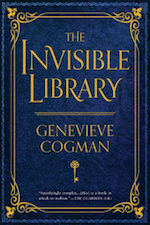 We’ve come a long way to get here, but The Invisible Library drops another circle on the Venn diagram of our micro-genre, this time adding an intermittent steampunk flavour. We live in a multiverse; in particular, all fictional worlds are real, existing somewhere on a continuum between Order (repressively dominated by Dragons) and Chaos (cavorted in by the Fae—who are always the protagonist of their own narrative). Outside of these worlds lies the Invisible Library, an infinitely large extradimensional institution whose librarians catalog and collect unique books from the entire multiverse (and by “collect” I mean “steal”).
We’ve come a long way to get here, but The Invisible Library drops another circle on the Venn diagram of our micro-genre, this time adding an intermittent steampunk flavour. We live in a multiverse; in particular, all fictional worlds are real, existing somewhere on a continuum between Order (repressively dominated by Dragons) and Chaos (cavorted in by the Fae—who are always the protagonist of their own narrative). Outside of these worlds lies the Invisible Library, an infinitely large extradimensional institution whose librarians catalog and collect unique books from the entire multiverse (and by “collect” I mean “steal”).
Irene is a junior librarian (or perhaps “spy” or “crazed bibliophile thief”) whose superiors assign her to a version of London in a chaos-infested realm—complete with steam carriages, fae ambassadors, a detective who is a dead ringer for Sherlock Holmes, incompetent werewolves, and clockwork alligators. Irene is a drily understated and extremely competent agent, but frequently finds herself struggling against challenges that threaten to outmatch her, both external and from within the bureaucracy of the Library itself.
In the hands of a less accomplished author this collection of tropes could easily turn into a disorganized and chaotic mess, but Cogman skillfully juggles seemingly disparate elements so skillfully hat she makes it look effortless. Again: the very highest quality of popcorn reading, and completely addictive.
The Chronicles of St. Mary’s by Jodi Taylor
Just One Damned Thing After Another
A Symphony of Echoes
A Second Chance
A Trail Through Time
No Time Like the Past
What Could Possibly Go Wrong
Lies, Damned Lies, and History
And the Rest is History
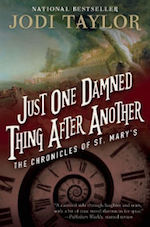 Max is an obsessive, somewhat damaged, history PhD when she manages to land a research position at the St. Mary’s Institute for Historical Research, one of those eccentric and small colleges British universities somehow can’t seem to get rid of. However, St. Mary’s harbours a secret in the shape of a small fleet of time machines, which the historians use “to investigate major historical events in contemporary time”. Keeping from damaging the course of history is easier said than done, especially when the incompetent and brutal Time Police show up and some of your colleagues are manipulative psychopaths: and time travel is far from safe hobby for academic historians as Max rapidly discovers (pursued by carnivorous dinosaurs and an abusive co-worker; nearly roasted during the destruction of the Great Library at Alexandria). And then there’s always the fun of writing grant proposals and ensuring the Institute can get enough funding to repair the damage the eccentric and accident-prone academics keep inflicting on the place.
Max is an obsessive, somewhat damaged, history PhD when she manages to land a research position at the St. Mary’s Institute for Historical Research, one of those eccentric and small colleges British universities somehow can’t seem to get rid of. However, St. Mary’s harbours a secret in the shape of a small fleet of time machines, which the historians use “to investigate major historical events in contemporary time”. Keeping from damaging the course of history is easier said than done, especially when the incompetent and brutal Time Police show up and some of your colleagues are manipulative psychopaths: and time travel is far from safe hobby for academic historians as Max rapidly discovers (pursued by carnivorous dinosaurs and an abusive co-worker; nearly roasted during the destruction of the Great Library at Alexandria). And then there’s always the fun of writing grant proposals and ensuring the Institute can get enough funding to repair the damage the eccentric and accident-prone academics keep inflicting on the place.
Taylor’s time traveling academics are a far cry from the Laundry but they share a common feature in the shape of heedlessly damaging bureaucratic forces that are almost as much of a threat as the Black Death and time-travelling murderers. Max is a fierce but occasionally fragile protagonist, with a line in sarcastic wise-cracks that reminds me of someone else …
Honorable Mentions
This has of necessity been a really short list. Lots of good stuff didn’t make the cut, and if I had room I’d rabbit on about some or all of: John Dies in the End (David Wong), Bookburners (Max Gladstone et al), Zero Sum Game (SL Huang), and the Rachel Peng series (K.B. Spangler). But I’m out of space for now!
Originally published July 2017.
Charles Stross was born in Leeds, England, in 1964. He has worked as a pharmacist, software engineer, and freelance journalist, but now writes full-time. To date, Stross has won three Hugo Awards and been nominated twelve times. He has also won the Locus Award for Best Novel, the Locus Award for Best Novella, and has been shortlisted for the Arthur C. Clarke and Nebula Awards. The Labyrinth Index, the latest novel in the Laundry Files series, will be available from Tor Books and Tor.com Publishing in October 2018. You can visit his blog, follow his Facebook page, or find him on Twitter at @cstross.










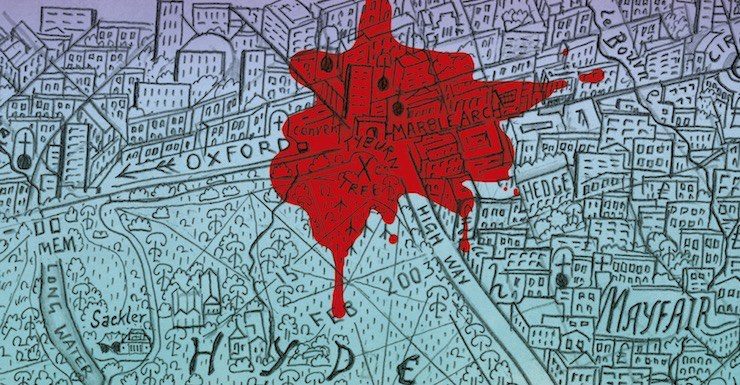
I like the Laundry Files (and I’m a massive, massive Stephenson fan to boot) but The Rise and Fall of D.O.D.O. left me entirely cold. Where were my infodumps!!!
One thing I’ve always wondered about the Laundry is why Persephone Hazard seems to lose a lot of the sexuality of Modest Blaise, while McTavish is pretty much right on Willy Garvin in feel. Some days I think it is because Stross doesn’t want to go near anything that might even hint at objectification of women, and some days I think it is just not his writing wheelhouse.
Ah well, I’ve recently transitioned from being a developer to more the BOFH side of the house and sometimes I miss the old Bob, but life is nothing without change :)
I know four out of the six series here and have enjoyed them all. But there’s one thing that makes Peter Grant really stand out. Normally when a modern character learns that magic is real, they just go along with the whole dog Latin, flick and swish, magic is an art thing. Peter applies the scientific method, and at the very least it has helped him progress pretty quickly.
Vinsentient: why Persephone Hazard seems to lose a lot of the sexuality of Modest Blaise — because the 1960s original had a really bad case of male gaze and I didn’t want to go there. Objectification sucks mightily (plus it’s a bad look to be wearing, as an author, in this day and age).
As an aside, I wrote The Apocalypse Codex in 2009-ish and was just waking up to the fact that there was a problem with much of my source material—the suck fairy had been hard at work while my back was turned. Switching from pastiches of spy thrillers to pastiches of specific contemporary fantasy subgenres let me escape the worst of the tar-pit, and so did shaking up the narrative viewpoint (Bob was already getting a bit tiresome and self-congratulatory at that point).
Both D.O.D.O. and John Dies at the End are the worst kind of great read.
DODO and St Marys make for a great pair.
I read them pretty much back to back last year, and they struck me as really demonstrating the stereotype of how the US and the UK would approach the discovery of timetravel: the one all military and black ops organised, the other chaotic and eccentric, held together by string.
Enjoyed them both immensely.
The Rook Files books by Daniel O’Malley, of which there are two so far (The Rook and Stiletto), are quite a fun mash-up of British espionage agents with X-Men-like powers. The lead character, Myfanwy Thomas, is also really well drawn and hilarious.
One of the many things I enjoy about the Peter Grant/Rivers of London series is the way that, while the police would VERY MUCH like to NOT deal with magic, they don’t go to the level of refusing to admit it exists. There *is* a system in place to deal with it, and most of Peter’s co-workers and superiors are irritated rather than in denial when magic crops up.
The muggles are annoyed, not stupid.
I’m curious how you feel about The Checquey Files, as they seem to also fall within this categorization. (as noted above) They’re certainly newer and unfinished, but The Rook especially is a fun, smart read.
for quick fixes of bureaucracy satire, check Sabrina Chase’s short stories from the Bureau of Substandards Annual Reports.
Jim Hines’ Terminal Alliance tries, but is better as general humor than as satire.
Of course there is also the classic short story sequence/series—Larry Niven, I think— where the time machine keeps bringing back things like unicorns… dates to late 1970s, if I remember, and was already discussing climate change (the time traveler had adapted to high carbon dioxide and had trouble remembering to breath in an I polluted world…).
Cornell doesn’t work for me— I want humor. Aaronovitch is awesome, and while dubious of her history, I enjoy laughing as I read Taylor.
Laundry Files are some of my favorite reads (please write faster). And I love the Peter Grant and the Invisible Library books, but count me as another who couldn’t get into D.O.D.O., don’t know why. Though with the raves it always gets, I’ll probably give it another try at some point.
I quite like the Shadow Police series, but I was already a fan of Cornell’s from his earlier novels Something More and British Summertime. Later, he wrote the screenplays for some of my favorite Doctor Who episodes such as Human Nature/The Family of Blood.
@@@@@vinsentient I hope you noticed that Bob’s full name is Bob Oliver Francis Howard ;)
I’m curious how you feel about The Checquey Files
Disliked the first book immensely, so did not bother with the second one.
I try not to trash-talk other writers in public so I shall say no more. Just remember, all taste is personal: that which doesn’t work for me may well work for you, and vice versa.
Kate Griffin’s two excellent urban fantasy series – the Matthew Swift novels and the Magicals Anonymous novels. Set in London, including deeply obscure bits of town that only a native would know. She now writes extremely creepy standalone fantasy novels of the literary yet ultra-violent kind as Claire North.
Jonathan L Howard’s Johannes Cabal novels. Steampunkish in flavour but without the cod-Victorian cliches.
One might also mention Jonathan Wood’s “No Hero” trilogy which exists in a triangulation between Stross, Aaronovitch and Douglas Adams. While not as good as any of the series given I thought that the first book was good enough that I’d pick it up again.
If you want to go “steampunk” gonzo alternative history Mark Hodder’s “Burton & Swinburne” series has been holding my attention.
Hm. I’ve never read the Laundry Files, but I’m a big fan of both Peter Grant and the Shadow Police (can somebody please pick up the last two books fort Paul (and us)?). Looks like its time to put Laundry on the list.
I think most people who like the Laundry Files (in the mode of A Colder War) would enjoy Warren Ellis and Ben Templesmith’s book Fell. The story was never completed (IIRC due to an accident with Ellis’ computer) but it was about a homicide detective transferred to the eldritch quarter of town. There were hints of a Lovecraftian influence in a lake or some kind of body of water nearby, but sadly it never paid off. The artwork is emotional and haunting and the writing is Warren-Ellis-y.
@3 cstross ah I thought that might be it.
@13 phuzz why yes, yes I did :)
Off-topic: oh man, I’ve just re-activated my jones for Invisible Sun so bad! I need to stay away from Stross posts.
18: vinsent:Off-topic: oh man, I’ve just re-activated my jones for Invisible Sun so bad! I need to stay away from Stross posts.
While I’ve now delivered the MS to my editors, “Invisible Sun” is running late. (Parental deaths do not play well with deadlines.)
loved the peter grant books, the shadow police and the rook and stilleto great too, dodo was a bust, i had the audiobook version, the first half is great, well spoken with believeable accents etc, the middle killed it, its just a massive list of emails that sucked the life out of the story, the last part is better though it never fully recovers.
I’d also throw in the Mike Carey Felix Castor books here. They’re darker, and don’t have the overlap into bureaucracy that the Laundry has, but I find I occasionally lose track of which sarcastic British magic user made a particular comment about London architecture – Bob Howard, Peter Grant or Felix Castor. The triangulation may be a personal quirk, so YMMV as always.
@19 cstross my condolences. It goes without saying, but I recognize you are not my b*tch.
I’ve read (well, practically inhaled) the first couple of Peter Grant books, and I’ve been thoroughly enjoying them. Thanks for the recommendation.
(I’m sure Peter and Bob would have an interesting conversation, especially about overbearing, gnomic, possibly immortal, bosses).
@23. phuzz
Wow, now I want that, a Peter and Bob story. We find out that they meet up once or twice a year (in a bar) to see what the other is doing
Well, I don’t think they can live in the same universe (computers die around Peter if he uses magic whereas Bob uses them for magic), but fortunately they both live in magical universes so I’m sure we can handwave some way for them to meet up. :)
Perhaps there’s a plane of existence with a bar for put-upon government employees and apprentice magicians to meet up and gripe. Question is, who else would show up?